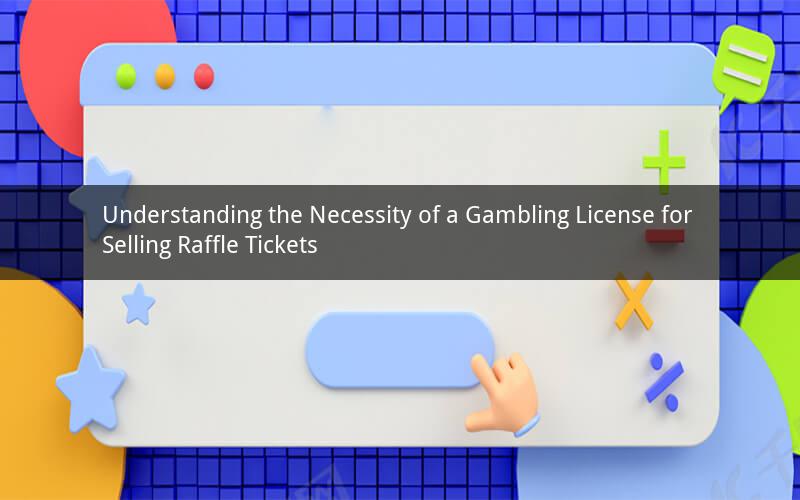
Raffle tickets have been a popular fundraising tool for various organizations and events for decades. However, many individuals and businesses are often left wondering whether they need a gambling license to sell these tickets. This article delves into the intricacies of gambling regulations and the importance of obtaining a gambling license when selling raffle tickets.
1. What is a gambling license?
A gambling license is a legal document issued by a government authority that allows an individual or entity to conduct gambling activities. These activities may include lottery, bingo, sports betting, and other forms of gambling. The primary purpose of a gambling license is to ensure that gambling is conducted fairly, responsibly, and legally.
2. Is it necessary to have a gambling license to sell raffle tickets?
The answer to this question depends on several factors, including the jurisdiction and the nature of the raffle. In some cases, selling raffle tickets without a gambling license may be permissible, while in others, it is a legal requirement.
2.1. Jurisdictions with specific regulations
In certain jurisdictions, the sale of raffle tickets is regulated under specific laws and regulations. In these cases, it is essential to obtain a gambling license to sell raffle tickets. Failure to do so may result in legal consequences, including fines and the suspension of the raffle.
2.2. Charitable and non-profit organizations
In many countries, charitable and non-profit organizations are exempt from obtaining a gambling license when selling raffle tickets. This exemption is often based on the assumption that the proceeds from the raffle are used for charitable purposes. However, it is crucial to verify the specific regulations in your jurisdiction to ensure compliance.
2.3. Private events and for-profit organizations
For private events and for-profit organizations, obtaining a gambling license may be necessary, depending on the jurisdiction. Some jurisdictions may require a gambling license for any type of raffle, regardless of the organization's status. In other cases, a license may be required only if the raffle's prize exceeds a certain value.
3. The importance of obtaining a gambling license
Obtaining a gambling license when required not only ensures legal compliance but also offers several other benefits:
3.1. Protecting participants
A gambling license ensures that the raffle is conducted fairly and responsibly. This protects participants from potential fraud or other illegal activities.
3.2. Building trust
By obtaining a gambling license, organizations and businesses demonstrate their commitment to legal compliance and responsible gambling. This can help build trust with participants and the public.
3.3. Access to additional resources
Having a gambling license may provide access to additional resources, such as legal advice, regulatory compliance assistance, and insurance coverage.
4. How to obtain a gambling license
The process of obtaining a gambling license varies depending on the jurisdiction. Here are some general steps to follow:
4.1. Research the specific requirements
Understand the gambling regulations and licensing requirements in your jurisdiction. This information can usually be found on the government's official website or through a local gambling authority.
4.2. Prepare the necessary documentation
Gather all the required documents, such as business plans, financial statements, and proof of charitable status (if applicable).
4.3. Submit the application
Complete the gambling license application and submit it to the relevant authority. Pay any applicable fees.
4.4. Wait for approval
The licensing authority will review your application and may request additional information. Once approved, you will receive your gambling license.
5. Conclusion
Whether or not you need a gambling license to sell raffle tickets depends on the jurisdiction and the nature of the raffle. It is crucial to understand the specific regulations in your area and obtain a gambling license when required. This ensures legal compliance, protects participants, and helps build trust in your organization or business.
Questions and Answers:
1. Question: Can a small non-profit organization sell raffle tickets without a gambling license?
Answer: In many jurisdictions, small non-profit organizations are exempt from obtaining a gambling license for selling raffle tickets. However, it is essential to verify the specific regulations in your jurisdiction.
2. Question: What is the typical process for obtaining a gambling license?
Answer: The process for obtaining a gambling license varies by jurisdiction. Generally, it involves researching the specific requirements, preparing necessary documentation, submitting an application, and waiting for approval.
3. Question: Can a business sell raffle tickets with a general business license?
Answer: In some jurisdictions, a general business license may be sufficient for selling raffle tickets. However, it is crucial to check if a separate gambling license is required for your specific situation.
4. Question: Are there any penalties for selling raffle tickets without a gambling license?
Answer: Penalties for selling raffle tickets without a gambling license can vary, but they may include fines, the suspension of the raffle, and legal action against the organizers.
5. Question: How long does it take to obtain a gambling license?
Answer: The time it takes to obtain a gambling license varies depending on the jurisdiction and the complexity of the application. It can range from a few weeks to several months.